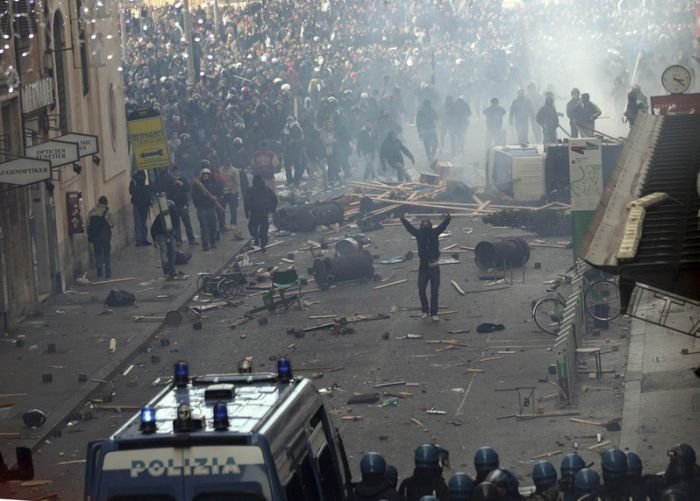Protesters Clashes Against Silvio Berlusconi, Rome, Italy
|
Mediobanca's annual report about the 10 biggest Italian companies showed that, in 1992, Berlusconi's media and finance group Fininvest had about 7,140 billion lire of debts, 8,193 billion lire of assets (with 35% of liquidity) and a net worth of 1,053 billion lire. The asset-debt ratio represented a patrimonial situation bordering on bankruptcy.
Between 1992 and 1993, Fininvest was investigated several times by prosecutors in Milan, Turin and Rome. The investigations regarded: alleged bribes (to political parties and public officials with the aim of getting contracts), alleged fake invoicing by Publitalia, the financing of political congresses and abuse of television frequencies.
On the other hand Bruno Vespa noticed that "In January 1994, Silvio Berlusconi was under no proceedings. Two members of the staff from the Ministry of the Finances were charged to be corrupted for a minor episode by a Fininvest manager, but the accusation would have later fallen. Aldo Brancher, who was working with Fininvest at the time, was charged for having financed some stands at the "Feste dell'Unità" and "L'Avanti!", and he would have been declared fully not guilty only in 2004. Paolo Berlusconi (Silvio Berlusconi's brother) was instead arrested ... after the Cavaliere went into politics." After having decided to enter the political arena, Berlusconi was investigated for forty different inquests in less than two years.
Berlusconi owns via Mediaset 3 of 7 national tv channels: (Canale 5, Italia 1, and Rete 4). To better understand the controversies over a conflict of interest between Berlusconi's personal business empire and his political office, it is necessary to look at the structure of governmental control over State television. Under the law, the Speakers of the two Houses appoint the RAI president and board of directors. In practice, the decision is a political one, generally resulting in some opposition representatives becoming directors, while top managerial posts go to people sympathetic to the government. It was normal to have two directors and the president belonging to the parliamentary majority, and two directors who are opposition supporters. A parliamentary supervisory commission also exists, whose president is traditionally a member of the opposition. During the tenure of Mr. Baldassarre as RAI president, the two opposition directors and the one closer to the Union of Christian and Centre Democrats left over internal disagreements that mainly regarded censorship issues. RAI continued to be run by a two-man team (mockingly nicknamed by the opposition the Japanese after the Japanese soldiers who kept fighting on in the Pacific Ocean after the end of World War II).
|
|















